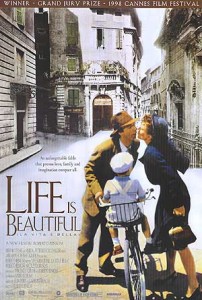For those who did not have the pleasure of watching this incredible movie, I am going to introduce you the main plot. A Jewish-Italian waiter, Guido, meets Dora, a pretty schoolteacher, and wins her over with his charm and humor. Eventually, they marry and have a son named Giosue. However, their happiness is abruptly halted when Guido and Giosue are separated from Dora and taken to a concentration camp.
I was impressed by how the director dares to find humor and tenderness in the midst of the Holocaust. Its main character Guido joked his way through this nightmare for the sake of his loved ones. He attempts to keep from the boy the horrors of what is going on. This eventually manifests itself as a game where the aim is to score a certain number of points. As a result, comic moments are abundant and Guido’s translation of the rules of the camp is particularly notable.
This is one of those movies that can have a lasting effect on you. No such piece of art has ever combined such laughter and tears of sadness in me before, and that is the miracle of the movie.
I could not help remembering Viktor Frankl’s amazing book Man’s Search for Meaning. From my point of view, both movie and book share the same message: hope is always necessary and possible. Even among the cruelty of war, they are able to provide us an insight into the beauty of love and life in general.
One of the most delightful paradoxes of the film is how even though the father appears to be saving his son’s life, in the end we could consider it the other way round. His son became a reason worth fighting for. As Nietzsche explains it, “He who has a why to live for, can bear almost any how.”
The movie also highlights one of Frankl’s most powerful ideas: we have the ability to choose our attitude, even in the most difficult situations. Our decisions about how to deal with our circumstances are the ones that will determine our own happiness. In Frankl’s own words: “Everything can be taken from a man but one thing: the last of the human freedoms—to choose one’s attitude in any given set of circumstances, to choose one’s own way.”
“Everything can be taken from a man but one thing: the last of the human freedoms—to choose one’s attitude in any given set of circumstances, to choose one’s own way.”
In the end, the movie has less to do with the Holocaust and more to do with the human feelings and the beautiful relationship of a father and his son. For that reason, some critics highlight that the realism of the movie is not its strong point. Personally, I believe that it is not supposed to be.
There are really remarkable aspects to Life is Beautiful such as the fantastic script-writing, the incredibly human characters, the awesome acting and the heartwarming story that help this movie to provide a story about how strong we humans can be, that in the face of adversity we can make the best of things. Life is really beautiful as you watch Guido’s relentless efforts to make a lovely, exciting experience of the concentration camp to his son.
María Estraviz did her first WYA internship with WYA Europe, and is currently part of the International Internship Program for the WYA Headquarters in New York City.
Find out more about what Viktor Frankl has to say by starting your WYA Track A Training today.
Like what you’re reading? Be sure to follow us on Facebook, where you can catch all our WYA Blog content including film reviews such as this one.
For even more information on what we’re watching, check out our Recommended Film List or join a WYA discussion group.








